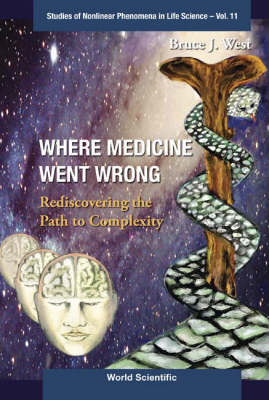
Where Medicine Went Wrong: Rediscovering The Path To Complexity
Seiten
2006
World Scientific Publishing Co Pte Ltd (Verlag)
978-981-256-883-0 (ISBN)
World Scientific Publishing Co Pte Ltd (Verlag)
978-981-256-883-0 (ISBN)
- Titel z.Zt. nicht lieferbar
- Versandkostenfrei innerhalb Deutschlands
- Auch auf Rechnung
- Verfügbarkeit in der Filiale vor Ort prüfen
- Artikel merken
Through insights into the science of complexity, traditional physiology is replaced with fractal physiology, in which variability is more indicative of health than is an average. This work explores how the idea of an average value has been misapplied to medical phenomena, distorted understanding and lead to flawed medical decisions.
Where Medicine Went Wrong explores how the idea of an average value has been misapplied to medical phenomena, distorted understanding and lead to flawed medical decisions. Through new insights into the science of complexity, traditional physiology is replaced with fractal physiology, in which variability is more indicative of health than is an average. The capricious nature of physiological systems is made conceptually manageable by smoothing over fluctuations and thinking in terms of averages. But these variations in such aspects as heart rate, breathing and walking are much more susceptible to the early influence of disease than are averages.It may be useful to quote from the late Stephen Jay Gould's book Full House on the errant nature of averages: “… our culture encodes a strong bias either to neglect or ignore variation. We tend to focus instead on measures of central tendency, and as a result we make some terrible mistakes, often with considerable practical import.” Dr West has quantified this observation and make it useful for the diagnosis of disease.
Where Medicine Went Wrong explores how the idea of an average value has been misapplied to medical phenomena, distorted understanding and lead to flawed medical decisions. Through new insights into the science of complexity, traditional physiology is replaced with fractal physiology, in which variability is more indicative of health than is an average. The capricious nature of physiological systems is made conceptually manageable by smoothing over fluctuations and thinking in terms of averages. But these variations in such aspects as heart rate, breathing and walking are much more susceptible to the early influence of disease than are averages.It may be useful to quote from the late Stephen Jay Gould's book Full House on the errant nature of averages: “… our culture encodes a strong bias either to neglect or ignore variation. We tend to focus instead on measures of central tendency, and as a result we make some terrible mistakes, often with considerable practical import.” Dr West has quantified this observation and make it useful for the diagnosis of disease.
Chance and Variation; The Expectation of Health; Even Uncertainty Has Laws; The Uncertainty of Health; Fractal Physiology; Complexity; Disease as Loss of Complexity.
| Erscheint lt. Verlag | 9.10.2006 |
|---|---|
| Reihe/Serie | Studies Of Nonlinear Phenomena In Life Science ; 11 |
| Verlagsort | Singapore |
| Sprache | englisch |
| Themenwelt | Medizin / Pharmazie ► Allgemeines / Lexika |
| Studium ► 2. Studienabschnitt (Klinik) ► Anamnese / Körperliche Untersuchung | |
| ISBN-10 | 981-256-883-2 / 9812568832 |
| ISBN-13 | 978-981-256-883-0 / 9789812568830 |
| Zustand | Neuware |
| Haben Sie eine Frage zum Produkt? |
Mehr entdecken
aus dem Bereich
aus dem Bereich
aus Klinik und Praxis
Buch | Softcover (2023)
Urban & Fischer (Verlag)
42,00 €
Buch | Hardcover (2017)
Hogrefe (Verlag)
60,00 €
Buch | Softcover (2024)
Urban & Fischer in Elsevier (Verlag)
56,00 €


